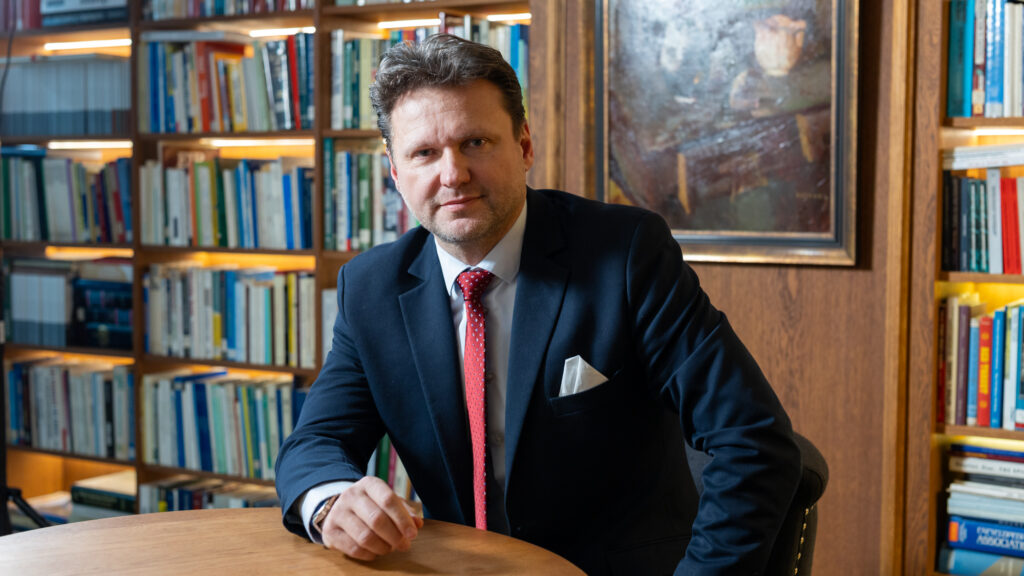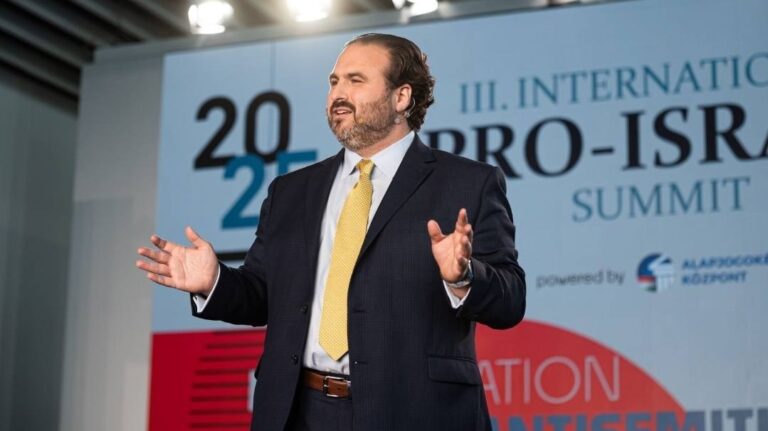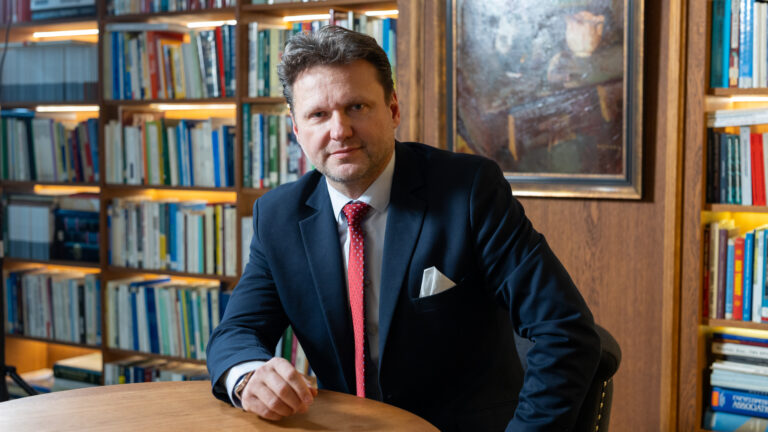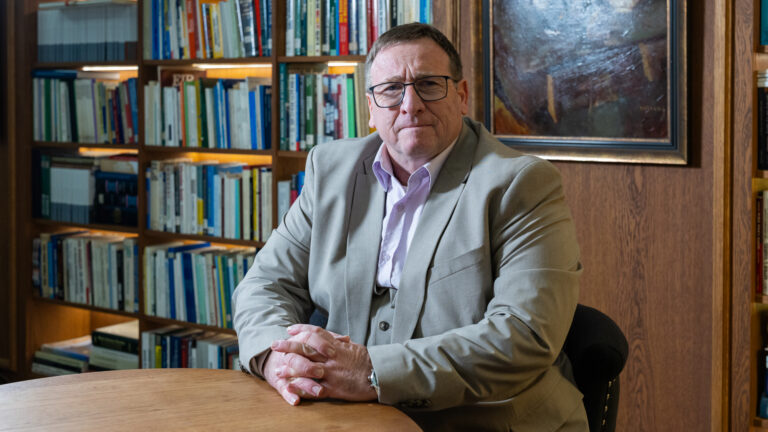Anna (Panni) Dohanics is spending her third year as a KCSP fellow in Portland, Oregon. If it were up to her, she would return again—she has grown so fond of the local Hungarian community. And it’s clear the feeling is mutual: the scout girl from Gödöllő is by now treated as a partner by her mentors and given full freedom in her work, during which she not only helps the Hungarian community in Portland but also supports those in Seattle, Washington. Her involvement goes beyond scouting—she assists with the Diaspora School Camps and whatever else the two communities may need.
***
Where did you grow up? What were you doing before coming to America?
I was born in Budapest, Hungary, and was a scout in Gödöllő at the currently largest scout troop in Hungary. I was immersed in an environment where it was natural to stroll through the site of the 1933 World Jamboree—to which I even have family ties. When my grandfather passed away, among his belongings we found a certificate signed by Pál Teleki—former prime minister of Hungary and the Hungarian scoutmaster at the time of that Jamboree—thanking my great-grandfather as a troop leader, for his work at the rally. Scouting was a natural world for me, but it only became truly serious when I became an adult. Until then, fencing training camps took up my summers, and competitions took up my weekends. I earned a degree as an information scientist and librarian. My goal was to work as a program organizer in a cultural center back home. But in the meantime, the Hungarian Scout Association (MCSSZ) launched a program office funded by EU money, where I worked for two and a half years as a program organizer before coming to the US.
Why did you apply for the KCSP scholarship, and why to Portland?
I first heard about the KCSP scholarship at the program office mentioned above. I felt it would be a good opportunity for me as well, so I applied in 2019. Given my scouting background, I assumed they would send me to the headquarters of the Hungarian Scout Association in Exteris (KMCSSZ) to the Garfield troop in New Jersey, but during the interview, they said they needed more help at the European center in Kastl, Germany. Then I received a final notification about Portland—a place I didn’t even know where it was at the time. I got in touch with a former KCSP fellow who had been there, and she connected me with members of the Portland community who helped me find a car and a place to live. My mentor was Tünde Balogh, who at that time was the honorary Hungarian consul for Oregon and Idaho states and ran the Hungarian preschool called Bóbita in Portland. The scout troop was still in its early stages then, having been organized by Ildikó Tóth, who moved there from Washington, D.C., and began gathering the children in 2017—that was the time when the first KCSP fellow arrived there. When I arrived in 2019, Bóbita was still actively operating, alternating weekends with the scout group, so I had to help with both. At the same time, the book club had already been running for two years, started by Kriszta Márkus and KCSP fellow Anikó Ivanics in 2017. In early 2020, we started to talk about launching a film club with Kriszta, but the outbreak of the COVID-19 pandemic disrupted those plans. Since then, it has been started by a couple; they meet every month, and there is a lot of overlap with book club members and scouts. These were my main responsibilities then, including helping at a carnival ball that was being revived after many years.

When and why did you return for the second time?
In 2020, I had plans for the entire summer with the KMCSSZ: I was going to assist at four different Diaspora School Camps and the Jubilee (Jubi) grand scout camp, but all of these were canceled due to the pandemic, so I went home, but I was craving to return and finish what the COVID-19 had interrupted. When it was announced that the postponed Jubi camp would be held in 2024, everything pointed toward me being able to continue what I had to leave behind before. So, I contacted troop commander Kristóf Tahy. By then, I already had an established place to move back into—one of the rooms in Ildikó Tóth’s house. By the time I returned, Bende Pigniczki had moved here from Cleveland, Ohio, and gave a major boost to the local scouting scene. He was very actively involved in getting our troop officially registered at the central organizing committee meeting in August 2023. We were assigned number 44 and the name Miklós Zrínyi. The troop has been growing ever since and currently has 17 members. Last summer, we all participated in the Jubi camp, and in the autumn, a cub scout patrol was launched with three members—they are already the troop’s fourth patrol. Scout meetings are held on Thursday evenings from 6pm to 7:30pm at Kristóf’s house, because almost everyone lives in that area; I’m the one who comes from the farthest. Until we don’t have about ten patrols, we can manage the troop meetings there.
What was the biggest new development in your second year?

The major innovation last year was the revival of the West Coast obstacle course, an annual scout competition. By the time I returned in the autumn, the organizing team was more or less already in place. It’s held on the same spring weekend as the central obstacle course in Fillmore, New York, and is built around the same storyline, but otherwise we had to start from scratch—the last similar event on the West Coast was held about 30 years ago. For us, traveling to Fillmore takes a lot of time and money, which we can’t manage during the school year—only in the summer, for the leadership training camps. In addition, on the West Coast, the two-year Hungarian heritage preparation program for patrol leader and assistant troop leader candidates is conducted regionally in person and remotely and is organized by Kati Gyulai. I taught there on Monday evenings, so the second year really ‘opened my eyes’ to the KMCSSZ. In fact, before the Jubi camp, I also took part in the leadership training program myself, so by now I’m a certified KMCSSZ scout leader.
So, in your second year, were your responsibilities mostly scouting-related?
Yes. By the time I returned in 2023, the Bóbita preschool was no longer functioning. There had been talk earlier about starting another school, but it didn’t happen. When it was suggested that everyone should just attend the online Hungarian heritage course, many parents felt it was too dry. Then, when the idea came up to start a new school with the help of the current KCSP fellow, the concern among parents was that it’d be too much alongside the now-weekly scout meetings. But scouting can’t include formal Hungarian language classes as part of its weekly sessions. We speak Hungarian during meetings, there’s a reading proficiency test before the summer camp, but that’s all that scouting can offer. Last year we couldn’t find a solution, but at the end of this school year, in May, we did manage to restart the Hungarian preschool—when, out of nowhere, about ten families expressed interest who we hadn’t even known lived in the area. I’m now gradually preparing to return home, but we hope there will be another KCSP fellow here next year who can help with this. Scouting helps with the initial launch, but in the long term, the goal is for parents to take over—just as they did with Bóbita.
How did the (re)launch happen? It could be an example for others…
The Portland scouts have a fundraising program: baking beigli for Christmas, which they sell at the December church service and use the proceeds to cover camp costs. This year, we introduced another similar fundraiser: pig butchering, which involves buying a half pig from a farm and processing it together. We make sausage and smoked bacon, which we sell at the Easter church service. While preparing for this event early this year, one of the parents ran into a Hungarian family with a six-year-old boy and invited them to the event. The mother asked whether there was a weekend Hungarian (pre)school. We reconsidered how many 4 through 6-year-old Hungarian children live in the area—kids who are too young to attend scouting. We posted on social media, sent out emails, and unexpectedly, about ten families responded. We (re)launched the preschool on 18 May and combined it with a scout program: the preschoolers came at 11am, the older kids at noon, and we played together. The parents asked for the program to continue over the summer, so we held a second session on the first Sunday of June, when another new family came with a little girl. Some families are already traveling to Hungary around this time of year for summer vacations, but even so, they asked for one more session in July so that, while I’m still here, the foundations can be firmly laid.

Did you also assist other organizations?
In addition to the previously mentioned activities, I was also able to help at other events such as the Easter and Mother’s Day gatherings, the harvest ball, and the autumn picnic. These are organized by Márti Szabatin under the framework of the Oregon Hungarian Club. She also organizes four annual Reformed church services tied to our religious and national holidays through the Portland Hungarian Reformed Church. These services typically happen with a Hungarian-language worship on Saturday in Portland and on Sunday in Seattle, connected to the major church or one of the national holidays, conducted by guest pastors, most often by Attila Palkó-Ágoston from California. We try to build connections with them, so we can apply for grants together. For now, we only receive support from parents’ workplaces—for example, Intel is our key sponsor—but we’re working toward broader collaborations in the future.
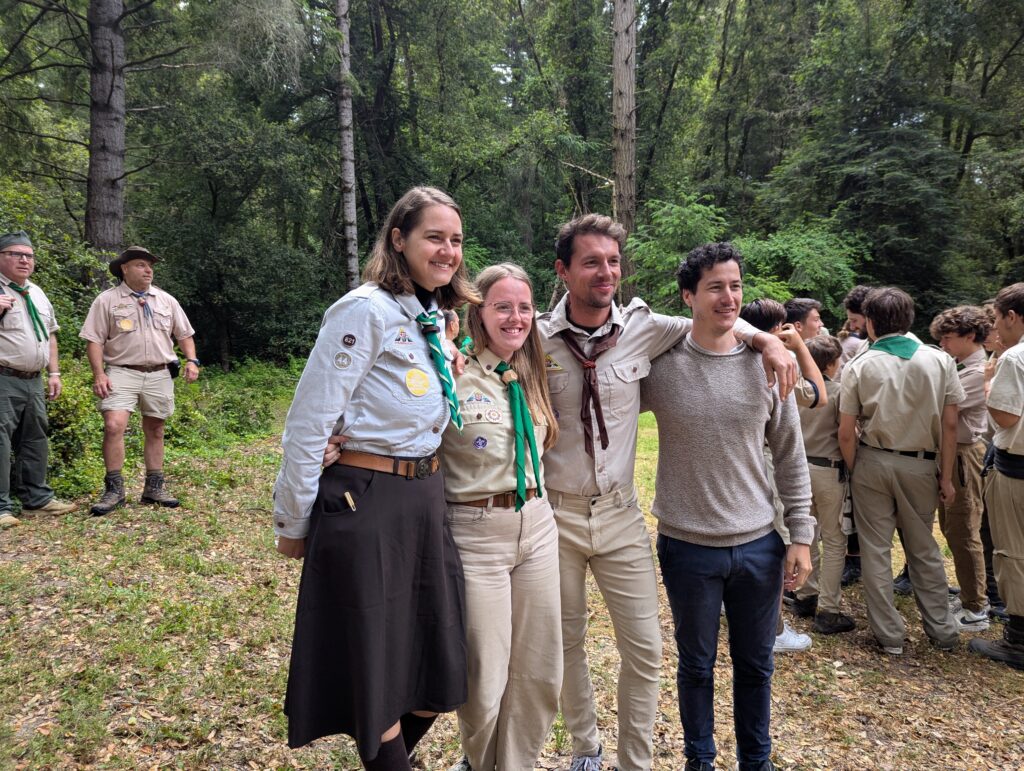
As far as I know, the Portlander scouts work closely with the Seattle troop.
Yes, we jointly organize our troop camps and the Diaspora School Camp in the autumn. The winter troop camp is held in Oregon, while the summer troop camp is held in Seattle, and both are open to members of the other troop. Even in 2019, when I was here for the first time, I worked very closely with them and traveled there often—I also attended their Christmas celebration and their scout dinner in March. Portland doesn’t yet have a scout dinner or ball; the support network here is still smaller, but the Seattle events are open to Portlanders as well. In fact, this year they even invited them to be among the opening dancers, but it didn’t come through, because it’s very difficult to organize joint dance rehearsals. We also considered a joint carnival event, which also fell through, but they might try again next year since there’s still interest in doing it together. In June, lots of Portlander Hungarians are traveling to Hungary, and scouting wraps up this weekend. Afterward, I’ll be able to help organize the summer camp in Seattle. When they requested a water-based program—because we expect hot weather conditions—I suggested Tüskevár as a theme without even realizing at first that its writer is the namesake of the Seattle troop.
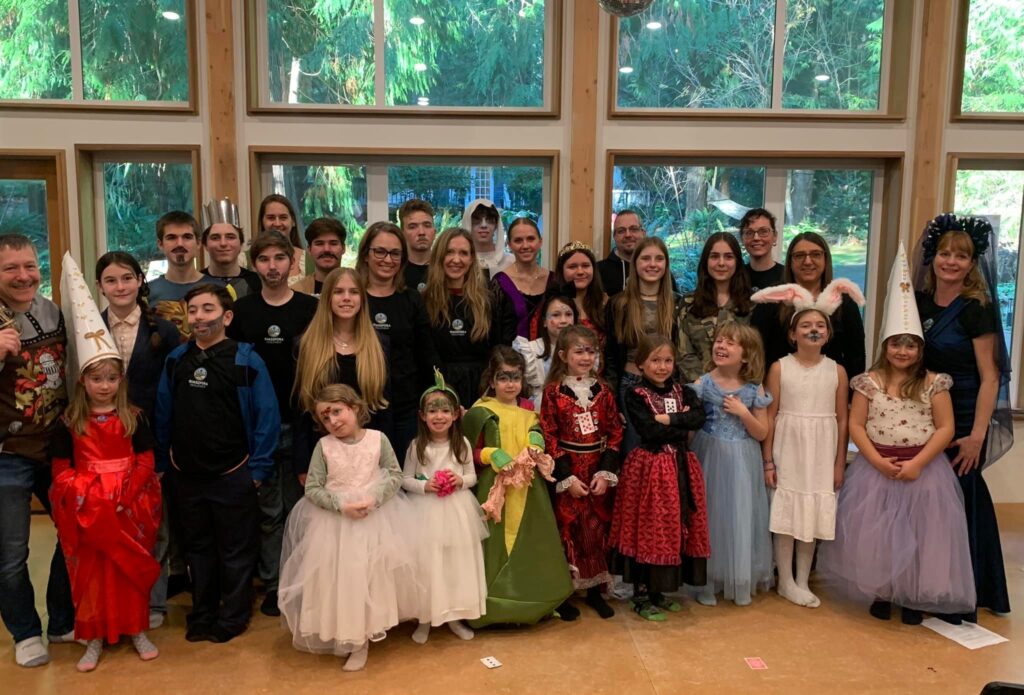
As for the Diaspora School Camp, I joined it upon the invitation of Andrea Szirbik, strengthening its scouting character, while technically it’s not a scout camp, so uniforms, flags, etc., are not required. In 2019, I put together the overarching storyline for that camp and introduced new types of programs, such as the Evening Fairy Tale Forest as a campfire program, and various scout games. In 2019, it was a more traditional school-style format; in 2023, when I attended the second time, we made it more playful, but for 2024, we brought teaching back again, followed by games, folk dance, and drama. Folk dance teaching is only possible when the resident KCSP fellow in Seattle has a folk dance background, while drama playing is present each time: Kriszta Márkus puts together a full performance, with scenes for every age group, which the children learn during camp, and perform at the end for their parents.
What were your roles and responsibilities in the Jubilee camp of 2024?
When it was announced that the scout KCSP fellows may stay for the Jubi, we were given free hand to choose which subcamp we wanted to help in—they were happy to have us anywhere, because help was needed everywhere. The three of us—Sári Péter from Cleveland, Ohio, Petra Fózer from Boston, Massachusetts, and Wallingford, Connecticut, and I—agreed that we’d support Sári as court ladies in the St. Stephen-themed storyline in which she’d play Queen Gizella. As members of the ’royal court’, we helped run the central games and participated in all the scenes in which the queen appeared. We weren’t involved in the planning or preparation of the camp; we ‘only’ assisted with the execution and running of the programs. Evenings were also occupied with storyline scenes: we accompanied the queen to the subcamps for dinner.
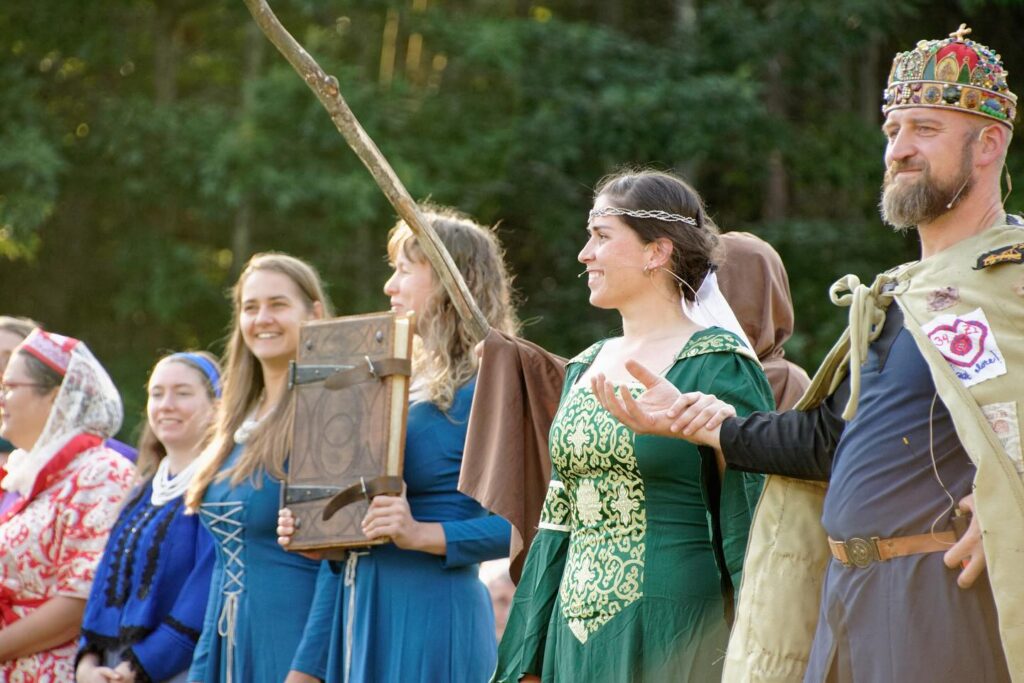
Have you been to such a large event before?
The only similar experience was the Central European Jamboree organized by the V4 countries in the Czech Republic in 2014, but that was not a Hungarian camp. There too, I helped as part of the central staff with running the programs, working in the kitchen, and cleaning—but this was completely different. In Portland, the children are typically first- or second-generation kids, and my first encounters with third-plus-generation Hungarians were through Bende, and later through many leaders at the Jubi. The evening gatherings, the conversations, and the games around the campfire with people from the US, Canada, Australia, and Argentina remain unforgettable. We are Hungarian scouts widely scattered around the world, and yet we speak the same language, sing the same folk songs, play the same traditional games—the power of that feeling is incredibly strong. And the evening campfires…It’s indescribable how it sounds when ‘Szellő zúg távol’ is sung by almost a thousand children around the opening or closing campfire.
What else attracted you there?
I noticed the active presence of many older scouts already during the pre-Jubi leadership training camp. Since MCSSZ was only restarted 35–36 years ago, beyond a certain age, there are no older scouts in Hungary—those who might have scouted before scouting was banned by the Communists in the late 1940s have largely passed away. Some scouts moved back home to Hungary after the fall of Communism, but in Hungary, we normally don’t have elderly leaders, and in general, there are so many young scouts that older ones tend to step aside anyway. The average age of troop leaders is about 20. One of the most powerful and deeply moving experiences of the leadership training camp here was hearing stories by the campfire about KMCSSZ-founder Gábor Bodnár, and then visiting his gravesite, where I remembered that, at age 15, my mother gave me a scout history book written by Bodnár. Listening to the many stories about the outgoing president, Imre Lendvai-Lintner, and the new president, István (Pista) Vajtay, was also a very humanizing experience. Even though we know they were once kids and teens just like us, by the time you’re 30, you don’t see them through rose-colored glasses anymore, but you still appreciate and deeply respect everything they’ve done. Another similarly lasting experience was attending the general assembly and the leadership transition event in New Jersey in February, where they praised Imre, listing his achievements of 30 years as president and sharing countless stories about him.
Why did you come back to Portland again?
Up until last year’s West Coast scout competition, I thought I was done: it had been good, it had been beautiful, but enough was enough. I had the chance to travel a lot—for example, I helped at the Diaspora School Camp in Texas, supporting Réka Balla and her team, and the kids there were amazing. I never would have thought I could connect so closely with a group over a single weekend. But even after that, I felt like I was simply checking off the things I had missed before—and that I’d be heading home. However, at the West Coast obstacle course, there was a moment when I felt: I can’t just walk away from this. I should continue because the energy I invested will only pay off later. I’m sure many KCSP mentors have said the same before: a returning KCSP fellow is worth gold. And it’s really true. We already know a lot about the local community, we don’t need to be directed on whom to talk to if we want to organize something, whom to contact if we need to rent a venue, etc. From this perspective, a returning fellow is much easier to handle both for the host organizations and for the sender Hungarian State administration. I had also put energy into building connections with the KMCSSZ, where I had to learn entirely different rules and traditions from those of the MCSSZ in Hungary, which I was really able to benefit from. So, by last summer, it was completely clear that I was welcome back, and I wanted to stay.
How was your third year different?
At this point, I don’t even feel like I’m a KCSP fellow anymore. While still in Hungary, the planning for this year’s West Coast scout competition had already begun, and at the first meeting, Bende and I agreed to take on the role of camp leaders. So, I became one of the camp leaders for a 100-person gathering, as a KCSP fellow. I lead the local scout meetings practically as an equal partner with Kristóf and Bende; I don’t feel like I need to ask for special permission for anything, which Kristóf is glad about, since he has a thousand other things to deal with. When I organize a program, he hands over his car without hesitation. If we go canoeing or rock climbing, I handle the rentals independently. Also, we organized the Diaspora School Camp the same way: Andrea had ideas; I carried them out. She relies on me just like Kristóf does—treats me as an equal, which is crucial for working together well and closely. We also continued Hungarian cultural education: for example, I took over teaching geography from Andrea.
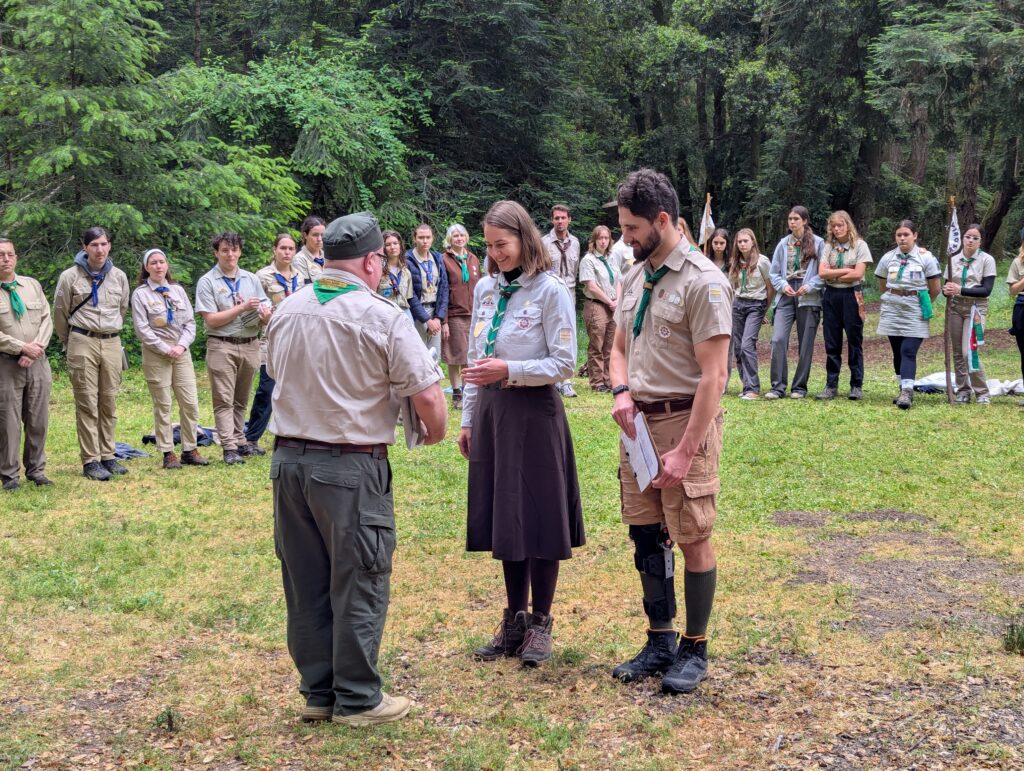
Could you share some lessons learned during your three KCSP years?
I feel that the Hungarian communities in Portland are a bit fragmented. There’s no church or community center/house here, but there are several small Hungarian circles with minimal overlap. In any case, there’s room for the Hungarian community here to grow. There are around 200–300 Hungarians in the state, but they are very spread out and lack a central hub that could unify things, like the umbrella organization, the Hungarian American Association of Washington in Seattle. That’s why they have a rotating system for the KCSP fellows there, who primarily help one organization, but can be ‘borrowed’ by the others. It’d be great to have a mobile consular office, too.
Personal and organizational frictions are every KCSP fellow’s nightmare. I didn’t experience any of that—in fact, I really liked being able to work not only with several organizations, but with two cities in two states. No one asked or expected me to help in Seattle, but it felt obvious, especially since this year they didn’t have a scout KCSP fellow. I wasn’t part of any local political games, I didn’t have to take sides or make decisions, and certainly not settle disputes. My mentors let me do whatever I wanted and go wherever I wanted, even climbing mountains in my free time. Ildikó and her family introduced me to this sport, and we go rock climbing at a gym twice a week, and on weekends we go hiking. I’ve already climbed Mount St. Helens in Washington state twice. Last year, I started thinking about Oregon’s highest peak, Mount Hood; this year, I prepared with a proper training plan, but still didn’t make it to the summit—so there’s something to come back for. I really feel at home here; I’d gladly stay—or come again as a KCSP fellow—but for administrative reasons, I’ll need to stay in Hungary for a while, where I’ll return in mid-September.
Read more Diaspora interviews:



